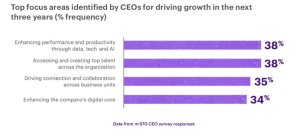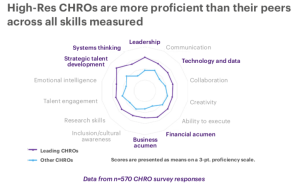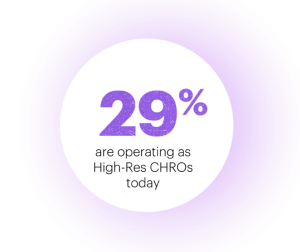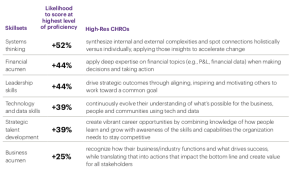Have CEOs finally seen the light?
For years HRDs have complained they either don’t have a seat at the executive table or, even if they do, their voices simply get drowned out by more influential leaders – the likes of the FD, COO and others.
But according to new research by Accenture, things are a-changing. It says CEOs “are stepping up,” – realizing they need to be leveraging “the full potential of data, technology and people” (see chart below) – and in doing so, they expect HRDs to step up too, and become what Accenture describes as ‘High-Res’ HRDs.

“In the past there’s long been questions about the capability of HR,” asserts Brian Kropp, managing director, Accenture, in an exclusive interview with TLNT. “But with the labor market as tight as it is, and the post-pandemic landscape now unfolding the way it has been, we’re finding 89% of CEOs now rate CHRO’s as vitally important in ensuring long-term profitable growth.”
But is the upshot of this about to create a whole new set of problems? Could CEO demands now be shifting so fast, that they are faster than HRDs are able to react and meet their CEO’s new-found expectations?
“HRDs are in a slightly better place than they were,” suggests Kropp. “Previously HR leaders had to battle to prove their worth; now at least HR has the opportunity to engage in the transformation of organizations. But where I do believe HR now has to be careful is that they can’t just say ‘we’re now going to have all this impact’ without first building their capability to make this real.”
In other words, Kropp is warning HRDs not to blow their big chance.
“The challenge now is how HRDs drive forward, to build and demonstrate their impact without over-promising to results-driven CEOs,” he says.
“HR’s big moment is here, but the pressure is to not get it wrong.” He adds: “When CEO appreciation turns into hard expectation, they’ll want more from their HRDs. They’ll want their HR leaders to deliver. And it’s not just the basic stuff they’ll want answered anymore; it’s the tough stuff like leveraging AI to increase workflows; creating talent marketplaces in order that the organization can deliver talent to wherever it needs it. It’s bigger picture stuff.”
The chicken and the egg
But do HRDs first need permission from the CEO to step up, or should it be they own the conversation about how to get more recognition?
Some might say this is the classic chicken and egg question. Whatever it is, it’s one that certainly assumes even greater relevance if human resources professionals are to become the ‘High-Res’ HRDs CEOs say they need.
So who needs to make the first move?
What’s certainly the case, is that Accenture’s research reveals CEOs do acknowledge that while they want to see greater impact from their HR teams, they haven’t always paved the way, to allow this to happen.
Only 45% of CEOs, by their own admission, agree that they are creating the conditions that allow CHROs to lead business growth. This trickles down to creating lack of agency amongst HRDs themselves: Only 29% of CHROs questioned said they have both the profile and the conditions they need to act as a ‘High-Res’ CHRO.
“We often talk about HR perhaps needing to take the front foot, when the reality, is that their dealings with CEOs should be more like a relationship,” says Kropp. “That said there are some CEOs that have vision, and prefer to lead from the front, while there are obviously others that just want to be lead. So HRDs need to read the mood.”
He adds: “What I think is new in this debate however, is that the talent reality has to map against the business reality, and HRDs need to think much more about the organization as an ecosystem.
So, he argues, HR’s future relevance will be how they partner to this, rather than just be on the fringes of it.
“The key,” he says “is to create the right environment in which this can happen. We know that activating the power of data, tech and people can boost profitability and revenue – by as much as 11% on top-line productivity – but we also see that only about 5% of companies are making it happen.”
It’s the people element that matters most
Accenture finds that organizations are capable of unlocking only 4% improvements in productivity when just looking at data and technology alone.
It’s bringing in the third element of ‘people’ that gives the extra 7%, to get to the 11% boost in productivity.
Says Kropp: ‘High-Res’ HRDs are those that can constantly reinvent the organization; want to continually improve the organizations, and they’re able to operate at a higher level.”
He adds: “The good news is that there are lots of HRDs out there that have the potential to be a High-Res HRD.
“I would say the hardest obstacle in all of this, is that CEOs have finally seen the light. They’re now more willing to put investment into the HR function. Now it’s the job of the HR function to demonstrate that this was money well spent.”
IN BRIEF: What is a High-Res CEO?
- High-Res CEOs are 4x more likely to have strong relationships of multiple influence across the entire C-suite – starting with the CEO, FO, CTO and COO.
- 88% of CEOs say their CHRO should be responsible for infusing a culture of innovation across the enterprise.
- Profile alone isn’t enough. Accenture finds that even when CHROs have the right skills and connections, 55% lack the conditions to impact business growth.
- High-Res CHROs are nearly 2x more likely to effectively connect data, technology and people than their peers
- When HRDs have an optimal environment, their CEOs are more than twice as likely to say the HR function is exceeding their expectations
- CHROs that adopt next-generation AI and digital tools, in combination with enabling partnerships and ecosystems, are 2.6x more likely to increase revenue by 10% or more than peers who do not.
- CEOs with a High-Res CHRO are 5x as likely to say their CHRO is directly improving the company’s environmental, social and governance (ESG) performance.

‘The CHRO as a Growth Executive’ – What the research shows:
- 89% of CEOs says the CHRO should have a central role in ensuring the company’s long-term profitable growth
- 45% of CEOs are creating the conditions that enable CHROs to lead business growth
- 29% of CHROs are found to be operating as ‘High-Res’ CHROs

CASE STUDY – The growing value of the chief people officer
As you might expect, Lisa Sordilla, chief people officer at accreditation company, Top Workplaces, knows plenty of about what makes HRDs relevant at the top table. “We’re all familiar the CPO traditionally being about administrative responsibility,” she says speaking to TLNT. “Well, this was leading from the back, rather than the front, and things are very much changing now.” She says: “I really feel the role of HR is evolving. The pandemic opened everyone’s eyes to the value that CPOs bring, and the value of HR leading the way. The success HR had in enabling people to work remote, without the organization really skipping a beat, was monumental. Now is the time HR needs to own data, own business impact, and tell this story to the C-suite. Talent development and providing professional coaching to people is also where the next big wins will lie, plus looking at the intersection of where wellbeing and business performance lies.” She adds: “In our business – which is remote-first – HR is looking at the better ways people can collaborate. We have people that are happily remote, but are also excited to meet people face-to-face, and work collaboratively. Whilst my organization has always had an appreciation of HR, I think that even here, we’ve been able to become more visible – but it’s more about visibility coming from using our tools to show our value.”

